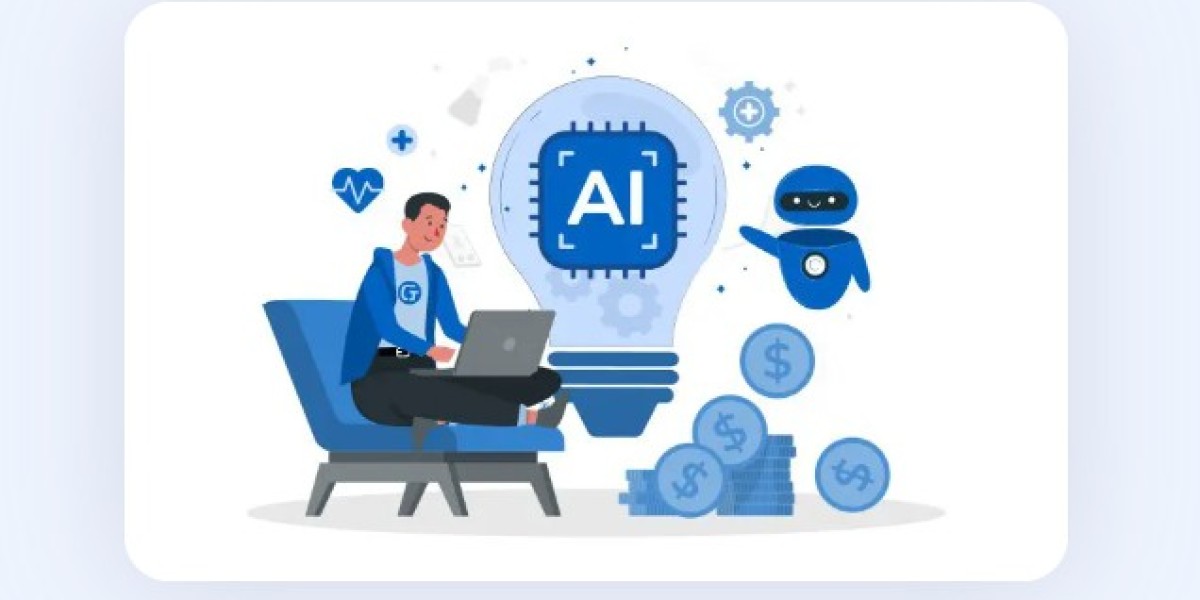The healthcare industry is undergoing a significant transformation, driven by the rapid advancements in artificial intelligence (AI). The potential of AI to reshape how healthcare services are delivered, how patients are treated, and how healthcare systems are managed is immense. But perhaps one of the most compelling aspects of AI’s impact is its economic implications. The integration of AI into healthcare is not only improving clinical outcomes but also revolutionizing cost structures, efficiency, and access to services. In this article, we will explore the economic impact of AI in healthcare, delving into its potential to lower costs, improve productivity, and drive innovation, while also considering the challenges that come with its implementation.
AI in Healthcare: An Overview
AI in healthcare refers to the use of machine learning, data analysis, and intelligent algorithms to perform tasks traditionally carried out by humans. These tasks range from diagnosing diseases to managing patient data, assisting in treatment decisions, and even personalizing care. The primary promise of AI in healthcare lies in its ability to process vast amounts of medical data quickly and accurately, uncover hidden patterns, and provide insights that were previously beyond human capabilities.
Key applications of AI in healthcare include:
- Diagnostics: AI tools can analyze medical images, genetic data, and patient records to identify diseases such as cancer, diabetes, and cardiovascular conditions earlier and more accurately.
- Treatment Recommendations: AI systems can assist doctors in formulating treatment plans based on a comprehensive analysis of a patient's medical history, lifestyle, and genetic predispositions.
- Robotic Surgery: AI-powered robots can perform surgeries with precision, reducing human error and improving patient outcomes.
- Predictive Analytics: AI can predict disease outbreaks, monitor patient vitals, and suggest preventive measures, all of which help in resource allocation and management.
- Drug Discovery: AI is accelerating drug discovery by analyzing biological data and predicting the effectiveness of potential treatments, cutting down the research time and costs.
These applications are not only enhancing patient care but also driving significant economic shifts in the healthcare sector.
The Cost Savings of AI in Healthcare
One of the most significant economic impacts of AI in healthcare is its potential to reduce costs. Healthcare spending, which constitutes a large portion of global GDP, is rising rapidly, driven by aging populations, the increasing prevalence of chronic diseases, and the inefficiencies inherent in traditional healthcare systems. AI is positioned to help alleviate some of these cost burdens in several ways:
1. Reducing Administrative Costs
Administrative costs in healthcare, including billing, insurance claims, and patient record management, are notoriously high. AI-powered systems can automate many of these tasks, reducing the need for human labor and minimizing errors. Natural language processing (NLP) and machine learning algorithms can help streamline claims processing, billing, and patient record management, which results in significant cost savings for healthcare providers.
2. Lowering Diagnostic Costs
Traditional diagnostic methods can be expensive and time-consuming. AI has the potential to significantly lower diagnostic costs by providing faster and more accurate results. For example, AI algorithms that analyze medical imaging can often identify conditions such as tumors, fractures, and other abnormalities more quickly than human radiologists. With faster diagnosis, patients can receive the right treatment sooner, preventing costly complications and hospitalizations.
3. Optimizing Resource Utilization
AI can improve the efficiency of healthcare resource allocation, ensuring that resources are used optimally. For example, AI can analyze patient data to predict hospital admissions, enabling hospitals to better manage bed capacity and staffing. It can also help in optimizing the supply chain by predicting the demand for medical supplies, ensuring that hospitals have the right amount of stock without overstocking or running out of critical supplies.
4. Enhancing Personalized Medicine
Personalized medicine, which tailors treatment plans based on a patient’s genetic profile and medical history, has the potential to reduce ineffective treatments and minimize adverse drug reactions. By utilizing AI to analyze vast datasets, healthcare providers can identify the most effective treatment options for individual patients, thus improving outcomes and reducing the costs associated with trial-and-error treatments.
5. Preventive Care and Early Detection
AI’s ability to predict health issues before they become severe is another cost-saving aspect. By analyzing large datasets, AI can identify patients at risk of developing chronic conditions like diabetes, heart disease, or stroke. Early intervention can help prevent expensive emergency treatments and reduce long-term healthcare costs associated with managing advanced disease stages.
Productivity Gains Through AI
AI is also contributing to productivity improvements within healthcare organizations. By automating routine tasks, healthcare professionals can focus more on patient care and complex decision-making. These productivity gains can help reduce the overall cost of healthcare while improving the quality of care delivered.
1. Accelerating Research and Drug Development
AI is transforming the pace at which new drugs are developed. By analyzing biological data and simulating how drugs interact with the body, AI can predict which compounds are most likely to succeed in clinical trials. This speeds up the drug discovery process and reduces the costs associated with failed trials, which can be significant. AI can also identify potential side effects earlier in the development process, leading to safer drugs and fewer adverse reactions in patients.
2. Clinical Decision Support
AI-driven clinical decision support systems (CDSS) can assist healthcare providers in making more informed decisions. By analyzing patient data and comparing it with vast medical knowledge bases, CDSS can offer recommendations for diagnosis and treatment options. This can reduce the time doctors spend reviewing patient histories and help them arrive at decisions more quickly, improving overall healthcare efficiency.
3. Improved Patient Outcomes and Reduced Readmission Rates
By enabling more accurate diagnoses, better treatment planning, and faster interventions, AI can improve patient outcomes. This not only benefits patients but also has economic implications. Better patient outcomes lead to fewer readmissions, fewer complications, and a reduction in the need for expensive emergency care. AI's ability to predict and manage chronic diseases can also help reduce the burden on hospitals, freeing up resources for other patients.
Job Creation and Economic Growth
While the integration of AI in healthcare may lead to some job displacement due to automation, it also creates new job opportunities. AI-driven healthcare innovation requires a skilled workforce, including data scientists, AI specialists, and engineers who develop and maintain AI systems. Additionally, AI will enhance the roles of healthcare providers by supporting them with more powerful tools, making their jobs more effective and less time-consuming.
The economic growth resulting from the implementation of AI in healthcare is significant. By improving efficiency, reducing costs, and accelerating innovation, AI is likely to stimulate the healthcare industry’s economic output. Moreover, as healthcare services become more accessible and affordable, they can contribute to improved public health outcomes, which in turn boosts workforce productivity and overall economic performance.
The Challenges and Risks of AI in Healthcare
Despite its many benefits, the implementation of AI in healthcare also comes with challenges and risks that could potentially affect its economic impact. Some of the key challenges include:
1. High Initial Investment
The development and implementation of AI systems in healthcare require significant financial investment. Hospitals and healthcare providers need to invest in the necessary infrastructure, training, and maintenance of AI systems. These initial costs can be a barrier, especially for smaller healthcare organizations that may struggle to afford such technologies.
2. Data Privacy and Security Concerns
AI relies heavily on large datasets, including sensitive patient information. Ensuring the privacy and security of this data is critical, as any breaches could result in significant legal and financial consequences. Healthcare organizations must invest in robust cybersecurity measures to protect patient data and maintain trust in AI systems.
3. Regulatory Challenges
The use of AI in healthcare is subject to strict regulatory oversight. In many regions, the approval process for AI-powered medical devices and treatments can be lengthy and complex. Navigating these regulations can slow down the adoption of AI technologies and delay the economic benefits that come with them.
4. Bias and Inequity
AI systems are only as good as the data they are trained on. If the data used to train AI models is biased or unrepresentative of diverse populations, AI could perpetuate inequalities in healthcare delivery. Ensuring that AI systems are trained on diverse and representative datasets is crucial to avoiding these disparities.
Conclusion
The economic impact of AI in healthcare is profound, with the potential to reduce costs, improve productivity, and drive innovation. From administrative automation to personalized medicine and drug discovery, AI is reshaping the healthcare landscape in ways that were once unimaginable. However, realizing the full economic potential of AI in healthcare requires overcoming challenges such as high initial investment, data privacy concerns, and regulatory hurdles.
As AI continues to evolve, its integration into healthcare systems will likely lead to more efficient, cost-effective, and equitable healthcare delivery, ultimately benefiting patients, providers, and the economy at large. By addressing the challenges and harnessing the power of AI, healthcare can move toward a future where better care is available to everyone at a lower



